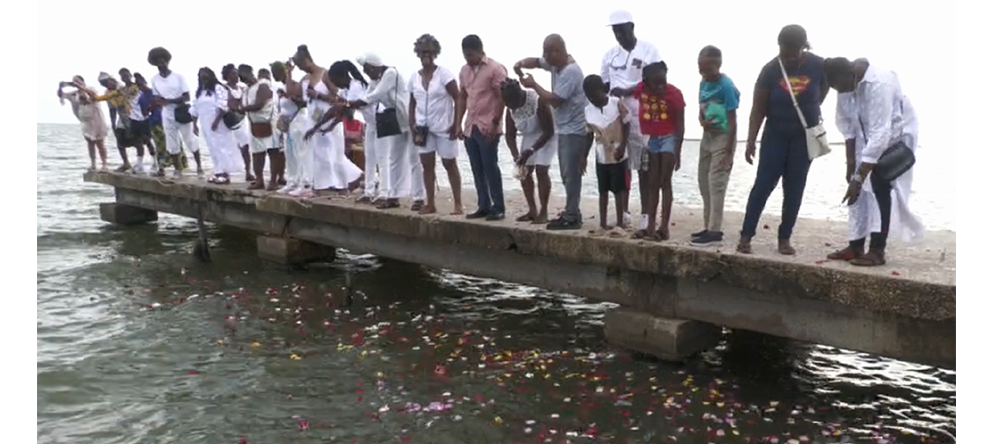Photo: Symbolic flower petals released at the seaside in Belize City
“… this cannot be a moment. This has to be a movement.” Hon. Cordel Hyde
BELIZE CITY, Thurs. Aug. 1, 2024
Belize today commemorates Emancipation Day, the day when slavery was abolished in the English speaking Caribbean, marking the beginning of enslaved Africans being freed from forced labour in the British Empire. For the fourth consecutive year, the day is now recognized with an official public and bank holiday observed, as per the advocacy of the UBAD Educational Foundation (UEF), on the day it falls.
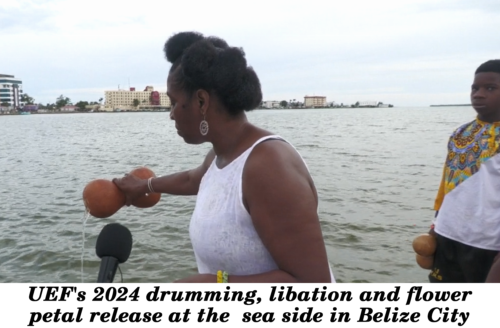
While UEF has been commemorating Afrikan Emancipation Jubilee Day for 11 years now, the state didn’t recognize the Day until 2019 and 2020, and a holiday for Emancipation Day was not declared until 2021. UEF’s use of “Jubilee” is in reference to a first commemoration of Emancipation Day in Belize spearheaded by Simon Lamb and others 50 years after Emancipation.
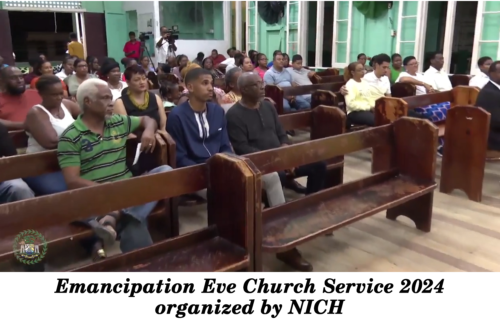
Now, in commemoration of Emancipation Day, the National Institute of Culture and History (NICH) has started including in its September Celebrations Calendar of Events an Eve of Emancipation Service held this year at 10:00 p.m. at the Queen Street Baptist Church in Belize City. The officiant, Pastor Lloyd Stanford, Sr. noted that the singing during the ceremony made him think of that moment when Belize’s black ancestors were singing praises as they awaited the announcement of their freedom. The celebration on the eve of emancipation itself was headed by the Baptist Mission in Belize and on Emancipation Day, as per research conducted by NICH officials this year, people were brought some 200 miles upriver to Belize Town to mark the occasion at what is today the Government House and House of Culture. However, according to the record keeper at the time, Patrick Walker, on the following day, “all those persons were back to their usual vocations.”
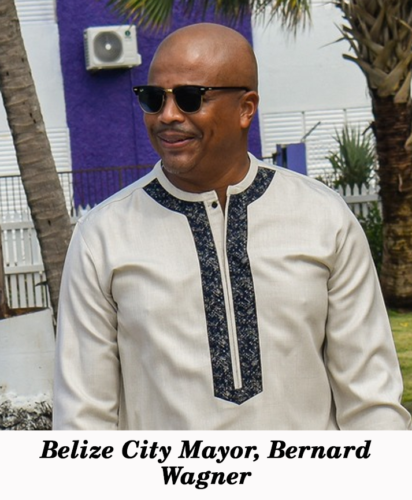
Mayor Bernard Wagner remarked to the congregants of Queen Street Baptist, “This day really symbolizes the triumph of the human spirit over the chains of oppression and unthinkable suffering borne by our ancestors during the transatlantic slave trade.” In reference to the vestiges of colonialism, Wagner detailed, “tonight reminds us of the enduring struggle for freedom and our unwavering resolve to reject today’s new, neatly wrapped and disguised form of colonialism and exploitation still being perpetrated against us as a people.” He called on Belizeans to “honor the sacrifices of those who came before us by holding the freedoms they fought so hard to achieve … let us pledge to continue their legacy, striving for a Belize where freedom is not just an ideal but a reality for every citizen.”
Providing some history on slavery in Belize, Giovanni Pinelo, Public History Officer at the Institute for Social and Cultural Research, shared that “about 1,900 individuals were enlisted in what became known as the slave register …” He noted that the register, along with those from our Caribbean sister nations, is recognized by UNESCO as part of the memory of the world. “Delving further, we come to documents that show that about 400 persons in Belize received some form of compensation for their ‘loss’ of human labour,” he shared. According to Pinelo, those same documents also show that people were given a financial value, “ranging from as low as zero for the elderly, for children, for the sick, for the ‘non-effective.’”
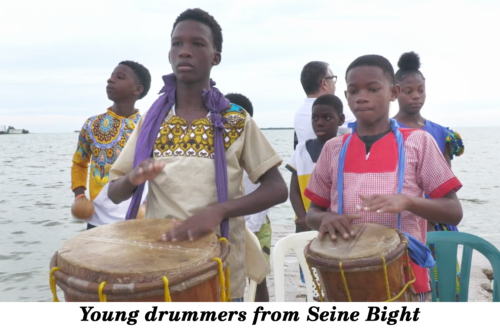
This morning at 6:00, at the sea side off Marine Parade, UEF held its annual drumming, libation and petal release ceremony to remember our Black African ancestors who were forcefully removed from the motherland. The drumming was performed by a small group of Garifuna youth from Seine Bight. Noting the significance of the ceremony, UEF Chairperson, YaYa Marin Coleman indicated that they gather every year to remember “wi sista, breddah, uncle, aunty, grampa, granny, children weh cross dis body ah waata – by force. Some ah dehn neva mek di crossing.” Marin Coleman emphasized that, as the first people of the world, the history of African people predates – in the thousands of years – the centuries of oppression they faced. She remarked, “they have been leaders in government, architecture, mathematicians, educators, scientists …” At the same time, she also highlighted that while the shackles were removed, we remain mentally enslaved.
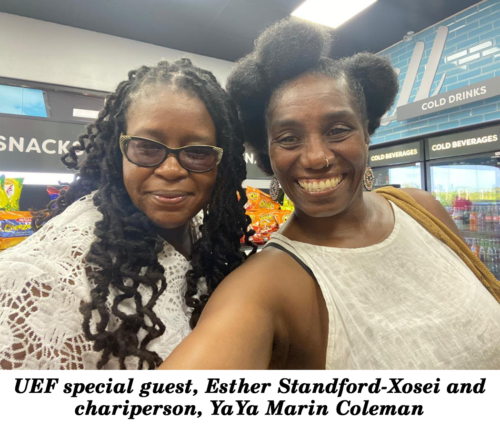
Reparations scholar-activist, Esther Stanford-Xosei, who made the trip to Belize from the UK this year to deliver the UEF Free Yo Mind community reasoning at 7:00 p.m. at the Gateway Youth Center, reminded that Emancipation Day is “a time to remember, to regather, and to rediscover who we are.” To achieve this process, Standford-Xosei says we must recognize “who we have been, who our people were, what their names were, what their cultures were, what languages they spoke, what visions of freedom they had. And then we add that to our own.” Stanford-Xosei described the end of slavery as a myth and deception, as all generations need to contribute their part to “higher degrees of freedom.”
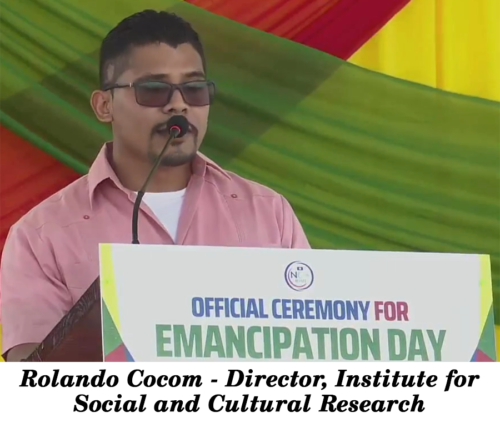
Delivering even more nuggets of history in a concerted research effort by NICH this year, Rolando Cocom, Director of the Institute for Social and Cultural Research, revealed at the Official Emancipation Day Ceremony at the House of Culture at 9:00 a.m. that according to archival records, Belizean patriot Simon Lamb, who is regarded as instrumental in keeping alive the September 10th celebrations, was actually NOT a member of the Centennial Committee. “Instead, he appears as an organizer of the 1888 Emancipation Jubilee Committee.” Cocom went on to share that historian Ann McPherson has cited that Simon Lamb “challenged the colonial status quo by commemorating emancipation. Although he did not directly challenge the foundations of enslavement and racism, the public remembrance of enslavement in Belize alone contested the prevailing idea that slavery was best not remembered.” Based on their research, Cocom pointed out that the Emancipation Jubilee Committee petitioned the Governor for the creation of a learning institute, but detractors called for a museum instead. The Governor at the time conceded to the Jubilee Committee’s request and a lot at the corner of Church Street and Duck Lane was assigned for the building of a People’s Hall. However, in July 1893 it was destroyed by a storm, and by then the Governor had withdrawn his support for the initiative.
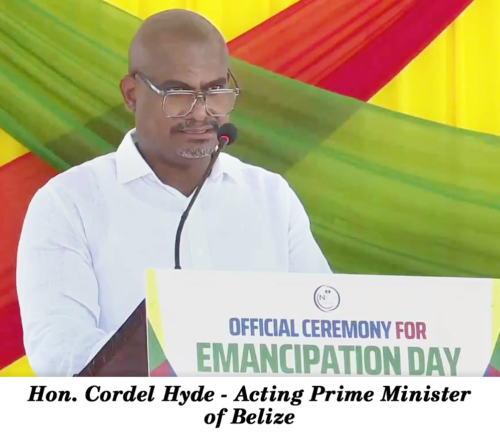
Delivering the official Emancipation Day address this year, Acting Prime Minister, Hon. Cordel Hyde shared, “I read somewhere that it rained that morning, 190 years ago. That August 1st morning of 1834 and the night before to usher in that day of all days – like God was talking to our ancestor back then, providing a renewal of spirit, the beginning of a cleansing of that blood-soaked earth. You see, our history is slavery and the characters are written in blood. But while the rain can wash the earth, we should never let it wash away our memories because to forget is to collaborate with our enemies – a monumental betrayal of our great grandfathers and grandmothers.” Reflecting on what our ancestors would have been thinking on Emancipation Day, Hyde stated, “They must have been elated, overjoyed – freedom at long last! … They could not have known that the lingering, haunting effects of slavery would stay with us to this day, almost 200 years later. They could not have imagined that today our black sons would be killing our black sons wantonly, mercilessly like almost every few days. They could not have imagined that freedom would prove so elusive, so fleeting, so distorted, so deformed – and that is why this cannot be a moment. This has to be a movement. We can’t just feel good today. We have to educate every day.”
Hyde today made a call to arms for us to honor the legacy of our ancestors “… by shedding this cloak of colonialism that still scars our collective psyche.” He affirmed that “Emancipation Day was not given to us; we had to fight for it. Independence Day was not gifted to us; we had to struggle for it.” Hyde called for us to upend the structures that “we got in place of slavery and colonialism, these structures that were designed to keep us divided, to control us.” He cautioned though, that “we cannot continue how we’ve been. We cannot do it drinking and smoking the pain away, and we cannot do it on social media. We have to do it in our homes, we have to do it in our schools … The looming question before us is, what will be the inheritance of the next generation.” Hyde ended his remarks noting our failure in leaving a country “better than the one we received.” “We failed thus far,” declared Hyde. He continued, “every time we call an SOE to order, we falter. We must strive for a day when our people of color no longer see their own and shudder, but laugh with love and wonder at the majestic beauty of mother Africa. Emancipation is a sacred duty, a generational responsibility. We will only be free as we want to be; it’s up to us. Each and every one of us.”
The commemoration of Emancipation Day this year included a first Eboe Town Festival at the Yarborough Green and Isaiah Morter Square.

